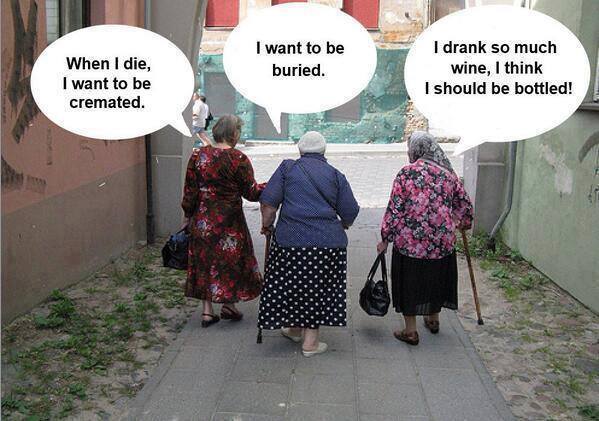VIEW
FROM THE DESK
 |
It is now winter for all our
readers in the Northern Hemisphere, but of course that means it is the
beginning of summer for the ones in the south. As I write this, it is
getting a tad chilly around our little Devon cottage so I decided to
feature a warm and sunny picture at the top of the page.
|
It is a photo we took back in
October in the beautiful north-east corner of Sardinia and looking at
it again makes me want to feel that warm sand on the soles of my feet
again. I'll have to wait till next year for that, now. But meanwhile I
can enjoy looking back over the pictures of our latest jaunt around
Italy, this time with some other family members in tow--see: http://www.elderwoman.org/Italy_Sept-Oct2014.html
Right now, like the bears and the squirrels and the hedgehogs, we are
settling in for the winter and making lists of the various projects we
want to get on with when it is too cold and/or wet to work outside.
Though I must confess that at this time of year, as the sap falls and
my energy falls with it, I find myself envying those bears their
ability to sleep right through till springtime. Unlike my daughter, who
gets ecstatic every time the snow falls, I am definitely not a cold
weather person!
I welcome all those new readers who have joined us since the last
newsletter and I hope you will find this one full of interest. And by
the way (I think everyone knows this but just in case there is anyone
who doesn't) all the back issues of the Elderwoman Newsletter are
archived online at http://www.elderwoman.org/newsletterarchive.htm
in case you ever want to browse through them. Speaking of which: I just
realized that I forgot to add the June 2014 one to that list
- oh dear, yet another senior
moment!! - so I have now done that.
Love and blessings to all,
Marian
|
FEATURE
ARTICLES
Between
Good and Enough
by Kathleen Martin
In
those years when I was rushing headlong from one
moment to the next, from getting one thing done to doing the next
undone thing,
I bypassed everything between those moments. I didn’t even realize that
there
was a between. I
was so busy tying up
loose ends that I had no appreciation for their looseness or that maybe
they
weren’t ends at all. I’m
now beginning
to recognize that there is a between and that loose ends might be
better left
loose. I like to
think about between as that space
to the right of good and to the
left of enough, a place where there
is always
room. It’s that
place I never want
filled because I want to experience it again and again.
It’s that place where I want to leave loose
ends because I so enjoy the tying up process.
Gardening is such a place for me.
I
can never get enough of gardening.
For me it’s an ornamental art that is forever
inviting me to invest my decorative inclinations.
I even cultivate weeds, managing and maintaining
space for what I deem desirable weeds from the invasion of undesirables. I don’t always plan my
gardening; I get
unintentionally sucked into its inexorable pull.
I’ll simply walk outside with my coffee to
enjoy the morning air and, before I know it, I’m pulling unwanted weeds
or
deadheading dying blooms. My
coffee
grows cold and unattended despite my craving for caffeine; my addiction
to
gardening is stronger.
Whenever
I step back from one of my immersions in
gardening, I find myself sighing deeply and with satisfaction. I have that good enough
feel and want more of
it. Gardening
always obliges with its
many loose ends—weeds and bugs and fertilizer; aerating, mulching, and
composting; harvesting one crop and replanting the next. I’ve tried organic
gardening, straw bale
gardening, and keyhole gardening.
I’ve
planted annuals and perennials and hybrids.
I’ve pinched back stems to promote branching, pruned
away dead wood to
allow new growth, and propagated cuttings.
And always there is more to do and more to learn. With gardening I am
guaranteed lots of
opportunities for that good enough feel.
There’s always one more good enough between good and
enough.
Back to top

More Thoughts on Electronic Communication
My article in the last newsletter about electronic communication ('I Post, Therefore I Am')
attracted several letters from readers. One reader, Jenny Jones, sent
me her own article, explaining her mixed feelings on the subject, with
particular reference to social networks. Here is what Jenny had
to say...
I would agree that the
ease with which we can now communicate with one another using technology is
wonderful, and it’s particularly good for enabling families to keep in close
touch even when they may be thousands of miles apart. In fact, using technology
for this purpose with those you are close to, those you can trust, is a modern
miracle. It’s particularly important for grandparents whose children have moved
to another county, state or country. Children grow and develop so quickly and
grandparents can feel part of their development and their lives if they speak
to them regularly using Skype or another medium where they can actually have
visual contact.
The world is made up of
many different types of people who are all at different stages of development
in their lives and in the greater journey of their souls. Some of the joys we
find in communication are the different connections we make during our
interactions. We use so many skills when we are in contact with one another and
many of these are essential to give us the security of knowing that what
someone else perceives from our contact is as close as it can be to what we, as
communicators, are putting across.
In face-to-face
communication, most of us pay attention to facial expressions. When someone is
being ironic, we often pick this up through facial expressions. When someone is
trying to suppress their emotions, we can see that emotion in their eyes. A
person who is finding joy or humour in their contact with us has an expression
that is pure happiness – it radiates from their whole face. When someone is
uncomfortable with us for whatever reason, they tend not to make eye contact or
have a permanent scowl on their face. These, and many more facial expressions,
act as our cues for how we respond or react to others.
Body language is also a
factor in our communication efforts, and this can often be more obvious to us
than we think, working at a deeper, subliminal level. The way someone shrugs
their shoulders or tilts their head can give us an indication of whether or not
they are resonating with what we are saying. When someone leans forward it is
often a signal that they want to know more. If they start to fidget, cross
their arms, or cross their legs, it can be an indication that they either disagree
or have no interest in what we’re saying.
The tone of voice someone
uses when responding to us is very important in giving us clues as to how they
may feel about something we’ve said. All of us have probably been in the
situation where someone is saying one thing but their intonation tells a
different story.
All of these indicators
are vital in clear and meaningful communication and some or all of them are
absent from many electronic communications. Many people would not say things to
someone’s face in the same way as they might in an email – they might not even
say them at all in person because they know it might upset, anger or
disappoint, and would possibly create an embarrassing or confrontational
situation.
I have come across quite a
large number of youngsters, both inside and outside of my healing room, who
have been seriously distressed by statements made about them on social
networking sites and by text and email messages they have received, sometimes
in the form of serial bullying. There is little anyone can do or say to make
them feel better because they know that once the information is on a website of
whatever type – and usually it’s embellished negatively or it is completely
untrue – they know it will be there forever and can be used in many different
ways, having the potential for further feelings of shame that attention has
been drawn to them in such a negative way.
For many people, the
concept of ‘friendship’ has changed when it takes place on social networking
sites. People vie with one another for how many ‘friends’ they can have on
their page, but these are mainly people who barely know them and could care
less about their lives. It is just an artificial yardstick for how popular a
person you are, with no validity whatsoever – and whilst most people understand
this, it is still of enormous importance to a large number of others.
In the world of most
teenagers, anything to do with social networking, texting or emailing often
becomes a significant part of the fabric of their lives, so that if it does go
wrong for any reason it feels like the end of the world. We all know how
important certain things were to us when we were teenagers and how, with
hindsight, we realise how trivial they were. But at the time this was our whole
world and being accepted by, belonging to, a group of friends was vital to us
in so many ways.
Many teenagers don’t have
the experience and knowledge of life to be able to discriminate between those
‘friends’ who will be loyal to them and those who will deeply upset them on
social networking sites. And they have none of the clues of facial expression,
body language and voice intonation to help them. These clues are all part of
learning how to interact with others in a meaningful, successful – and dare I
say it – loving way. Those teenagers – and even those who are in their thirties
– that I have come into contact with face-to-face who have had to endure
insensitive treatment on social networking sites, often by those they trusted,
have found it very difficult to trust again, either electronically or in
person. I find this very sad.
| 
|
I would emphasize that I’m
not a Luddite where electronic communication is concerned. I use email
extensively but not social networking sites. I know that electronic
communicationsare vital in social and business arenas, and I have enormous
admiration for the talent and inventiveness of those who have created these
media. But when I see a family of perhaps five people sitting around a table in
a restaurant all totally absorbed in their particular electronic gadget, not
interacting with one another only with the gadgets, and when I see mothers too
absorbed in their mobile phones to talk to or keep an eye on their children, I
know the balance has been distorted. I mourn the loss of sensitivity to others
by many using these media and hold the strong hope that we will reach a better
balance overall as time goes on; a time when we understand we have to be
actively aware and wary of the pitfalls of electronic communication.
Jenny Jones

Another reader, Ginny Braun, wrote...I am quite involved with Facebook and have been for
several years. I got on it reluctantly to stay in touch with a wandering teen
granddaughter, but have found it very enriching for many other reasons. I have
connected with high school classmates, some of whom I barely knew when we were
in school together in another state. We are all 70 or 71 now and the things
that separated us are unimportant now, at least to me.
It is also very useful to me as a La Leche League Leader of only a few years.
At the urging of my daughters, I became a Leader to help a Group in a nearby
suburb. I was retiring from social work and this adventure fit nicely into my
life.One of my daughters and I co-Lead the Group (breastfeeding/mothering info
& support in case you're not familiar with it). I am constantly working to
keep up on what's new in this field and to reach out to mothers who have
questions and challenges with their little ones. I am on several sites where
mothers trade ideas. It is a daily learning experience for me, and I am also
able to sometimes be helpful.
I find that texting and occasional e-mailing are the best ways to reach my
daughters and older grandchildren, though one daughter often calls me late at
night on her way home from her hospital shift ( she's an attending physician).
I have 4 daughters, 17 grandchildren ages 6-30, and one great-grandchild who's
3. Four years ago, after my husband was diagnosed with cancer, we moved to a
senior apartment near all of them so we can be more involved in their lives.
Ginny Braun
It
has been great to hear other people's thoughts on this subject.
Thank you, Jenny and Ginny! As for me, my motto, when it comes to
social networks, is 'horses for courses.' Facebook is useful for (a)
promoting my books and the 'good causes' that are important to me, (b)
keeping track of what is happening in the daily lives of a wide network
of friends and relations around the world, and (c) getting a sense of
what is going on in the popular culture - especially as we don't watch
TV. But if I want some in-depth interaction with like-minded people I
go to one of the lesser-known or 'members only' networks those people
hang out on. And if I want to talk with other elderwomen, well...asyou
all know, that's why I started Elderwomanspace. It's a warm, lovely, lively place to go.
Losing the Knack: old age
and multitasking

Multitasking—defined by
the dictionary as the performance of multiple tasks at one time—is something I used to believe I
was very good at. I prided myself on it, in fact. And back in those years when
I was working in a busy health and welfare agency with lots of things happening
at the same time and never enough hours in the day, it was useful to be able to
do several things simultaneously. Like for instance writing up file notes from
the last interview while talking on the phone about something unrelated.
In the home, of course,
there are even more situations where the ability to multitask is necessary—even
essential. Anyone who has ever worked single-handedly to prepare a complex meal
for half a dozen people and have everything ready for serving at the exact
right time can vouch for this. A young mother sweeping up crumbs, stirring a
pan of soup, and keeping an eye on a toddler—and all the while chatting to a
friend—can vouch for it too.
As this
article suggests, multitasking is probably something born in humans out
of evolutionary necessity. And I have
always subscribed to the notion that women are even better at it than men,
although this
other article says that science has now cast some doubts on that.
But what I have been
noticing about myself lately is that now, at 78, I seem to be fast losing the ability
to do more than one thing at a time. That even includes the ability to do some
straightforward physical task while thinking about something else. Take
yesterday, for example. After picking some greens from the garden and washing
them, I placed a pan of water on the bench and placed the steamer next it. And
then, in the fraction of a second it took my mind to get captured by some
unrelated thought, I picked up a handful of greens and dropped them into the
water instead of the steamer.
So is there, I wondered,
any documented connection between getting old and losing this multitasking
faculty? As usual, a quick search on Google and the answer was there. Yes,
there is a correlation. Not because we are losing our memories but because in
fact we never could really do more than one thing at once; we simply thought we could. The word
'multitasking' actually comes from computer science. A computer can appear to
perform several functions in the same time frame because it is actually
switching so rapidly from one to another and back again that we don't realize
that is what it is doing. Likewise with our brains. What really happens when we
perform two tasks together is that our brains switch our attention back and
forth between them so fast that they fool us into thinking we are doing them
simultaneously. The only reason it changes when we get older is that our
switching mechanism gets less efficient. Here
is an article that explains the science behind it.
So is this bad news? Well
I thought it was, at first. But then I suddenly realized that this change in my
brain is really a highly significant developmental marker. It brings an
important message. What it is signalling to me, in the most clear and obvious
way possible, is that if I haven't already learned to practise mindfulness it
is now imperative that I do so. For it is only by staying in the present
moment, being fully there and present with whatever I am doing, whether it is writing
a letter or simply chopping carrots, that I can finally make that crossing from
a life of 'doing' to a life of 'being.' This is, of course, the Stage 8 ('late
elderhood') that Bill Plotkin described in his marvellous book Nature and the Human Soul. It is our soul's
relocation from the 'Grove of Elders' into the 'Mountain Cave.' You may
remember that I wrote about this in some detail in one of these newsletters
three years ago. (Here's a link to that piece: http://www.elderwoman.org/jun11news.html#soul
)
So if and when you find
your ability to multitask starting to diminish, take heed. It may feel like a
loss, but if you can see it as an invitation to deepen into the practice of
mindfulness then suddenly it might feel less like a loss and more like a
spiritual signpost, guiding you along the path.
Back to top
LINKS/REPORTS/NEWS/BITS
AND PIECES
...And so say all of us!!
..............................................................................................................
Congratulations, Elaine!
Massachusetts
author Elaine Frankonis, who has been a reader of this newsletter since 2007, has
finally filled the only item on her bucket list. Elaine is proud to announce
the publication, in January 2015, of her first ever poetry chapbook. She has called
it What the Seasons Leave.
“The poems in
this chapbook,” she explains, “become a brief episodic memoir of an ordinary
life lived with a sense of personal myth and magic."
A “chapbook” is
a small collection of poetry centered around a specific theme and published in
a limited edition. What the Seasons Leave begins with the metaphor of a compost pile
and ends with the image of:
...spears of
brazen Jerusalem artichoke,
that perplexing garden gypsy
that blossoms and burrows,
grows up to nine feet tall, and
in the harsh summer storm
dances her defiance
to the grim arrogance
of gravity.
Over the past
50 years, Elaine has had her poetry published in a variety of small presses and
online journals (some of which no longer exist). Earlier versions of several of
the poems in this chapbook have previous appeared in The Berkshire Review, the Ballard
Street Poetry Journal, and Mused: the BellaOnline Literary Journal. In 1998, several of her pieces appeared in
the anthology Which Lilith: Feminist
Writers Recreate the World's First Woman.
You may also know Elaine from her blog, http://www.kalilily.net/ which was one of the early blogs by women to appear on the Internet .
Copies of What
the Seasons Leave can be pre-ordered online at www.finishinglinepress.com. Click on “preorder forthcoming titles.” It can also be
ordered directly from the publisher.
Send a check or money order in the amount of $15.58 (includes $2.99
shipping), to:
Finishing Line
Press, Post Office Box 1626, Georgetown, KY
49324. |  |
...and another of our readers, Alice Theriault, has just published a book she would like to tell us about. Alice writes: I would like to tell you
about my newly published book entitled, 'Take Hold of Heaven, Thirteen Spiritual
Truths for Parents and Children,' self-published by Balboa Press. It is not
about religion but about spirituality, the common thread among all of us so
easily overlooked. It is a wake-up call for the great potential and connection
amongst us all---our source of being, abounding everywhere and in everyone. I
hope you will take a look on Amazon.com
or Barnes
& Noble online.

Click on the banner above to go to Alice's website and read some more about her and her book
...............................................................................................................
 | A Passionate Woman Speaks Out
"How to Live Passionately, No Matter Your Age"
A TED talk by popular novelist Isabelle Allende
Click HERE to view it |
..............................................................................................................
Back to top
Wisdom of the Crone

Lani and Melinda from Wise
Woman Ink write…
Greetings One and All!
It's amazing to imagine
that the Wisdom of the Crone, daily wisdom card deck is turning 10!! So in her
honor we are releasing the Wisdom of the Crone 10th Anniversary Limited
Edition! We have added new cards and brought the deck up to her full potential.
For this edition we have
gone back to the original price of $19.99, this is a run of only 1000, and so
far the pre-orders keep flowing in!
Wisdom of the Crone can be
ordered by emailing us at info@wisewomenink.com,
Thank you so much for all your support and love over the last 10 years! Here's
to many many more!
"When you seek the
truth, ask the wise woman within."
Lani & Melinda
Wise Women Ink
POB 1450
Mt Shasta, California
96067
1.866.641.1451
Crones Counsel
Lastly,
for those of you who may have thought of going to a Crones Counsel
gathering and wondered what it might be like, there is now a very
full description of this year's gathering, along with dozens and dozens
of photos, here.
(If I was not limiting my flying in order to save carbon, I would have
been there too, for sure, hanging out with those beautiful red rocks
and beautiful crones.)
Back to top
POETRY
|
Interpreting
Signs
The
pluckÚd eyebrows still grow back; A secret symptom only we, The caged in
age, perceive. We watch and seldom grieve. We know our bodies Singular-
collectively; We see what’s stopped, What’s slowed, what’s new; We know
what we inhabit but, We feel what we have always been. We know how to
interpret. Arlene Corwin
|
|















